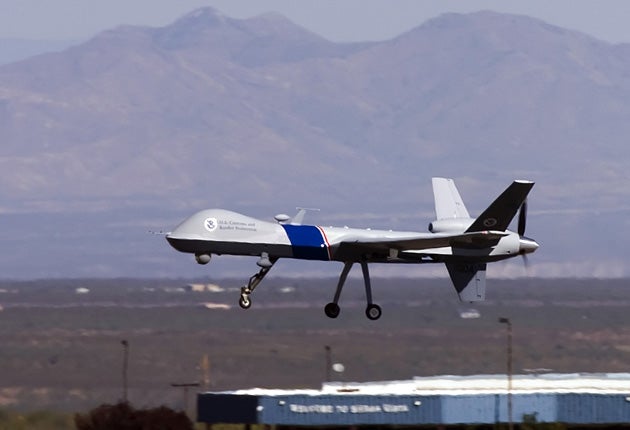Top judge: 'use of drones intolerable'
Unmanned weapons are condemned by Lord Bingham as 'beyond the pale'

The use of unmanned drones as weapons of war in conflicts around the world has been called into question by one of Britain's most senior judges. Lord Bingham, until last year the senior law lord, said that some weapons were so "cruel as to be beyond the pale of human tolerance".
In an interview with the British Institute of International and Comparative Law, Lord Bingham compared drones, which have killed hundreds of civilians in Afghanistan, Pakistan and Gaza, with cluster bombs and landmines.
His comments are bound to intensify calls for new international rules to protect civilian populations from arbitrary attacks launched by the pilotless craft.
Lord Bingham asked in the interview, which addressed the issue of the state being bound by the rule of law: "Are there, for example, and this goes to conflict, not post-conflict situations, weapons that ought to be outlawed? From time to time in the history of international law various weapons have been thought to be so cruel as to be beyond the pale of human tolerance. I think cluster bombs and landmines are the most recent examples.
"It may be – I'm not expressing a view – that unmanned drones that fall on a house full of civilians is a weapon the international community should decide should not be used."
Drones have become an important weapon against the Taliban in the remote mountainous borderlands of Afghanistan and Pakistan. Britain has said it plans to use drones as weapons. The Army already deploys them to gather battlefield intelligence. Last month the US admitted to 26 civilian deaths in a series of drone attacks that took place in May. In those attacks Afghan officials put the death toll at 140, significantly higher than the US claims.
Last week Israel was accused of using missile-firing drones to unlawfully kill at least 29 Palestinian civilians during the Gaza Strip war.
Despite having advanced surveillance equipment, drone operators failed to exercise proper caution "as required by the laws of war" in verifying their targets were combatants, said Human Rights Watch, the New York-based monitoring group, in a 39-page report. It described six alleged strikes by remote-controlled aircraft.
Israel has a fleet of spy drones, also known as unmanned aerial vehicles (UAVs), but refuses to confirm or deny widespread beliefs that some of the aircraft also carry weapons.
International lawyers also argue that air strikes using drones are state-sanctioned assassinations where the targeted suspected terrorist has no opportunity to defend the case against him.
Last month US drone aircraft killed at least 45 Pakistani Taliban militants in south Waziristan when it fired missiles at the funeral of an insurgent commander who was killed earlier that day.
In a reference to the detention under the Terrorism Act of 82-year-old Walter Wolfgang, who heckled Jack Straw at the Labour Party conference in 2005, Lord Bingham, a former lord chief justice and master of the rolls, called on states to use anti-terror powers proportionately. He said: "Again, we probably agree that powers should be exercised for the purposes for which they were conferred in the first place, and therefore a source of obvious concern – and this would be multiplied worldwide – [would be] if a power enacted to counter terrorism is used to arrest a heckler at a party conference."
Last year in his first major speech since his retirement as the senior law lord, Lord Bingham disputed the legality of the 2003 invasion of Iraq by the US, the UK and allies. He said that the invasion and occupation of Iraq was "a serious violation of international law", and he accused Britain and the US of acting like a "world vigilante".
Remote-controlled death: Unmanned aircraft
*The Predator, and its successor, the Raptor, is a remote-controlled aircraft system which first came into use in 1995. It can be deployed for reconnaissance and missile attack. The air-strike version is armed with two Hellfire missiles and has been deployed over Afghanistan, Pakistan, Bosnia, Serbia, Iraq and Yemen.
It is estimated that 300 people have been killed in at least 30 drone strikes since August 2008. During the initial phases of the 2003 US-led invasion of Iraq, a number of older Predators were stripped down and used as decoys to test the Iraqi air defences. Britain has been employing a reconnaissance version since 2006.Sometimes drones and their remote operators make mistakes and kill innocent civilians.
Two years ago a Predator fired a missile into a wedding party in Afghanistan, killing at least 30 civilians, including children. But they have proved successful in the war against al-Qai'da and the Taliban, who have both lost high-ranking leaders to the unmanned aircraft.
High-profile victims include Hamza Rabia and Abu Laith al-Libi. They have also killed Mohammed Atef, reputedly al-Qai'da's chief of military operations, and several of the group's most experienced explosives and biological weapons specialists.
Join our commenting forum
Join thought-provoking conversations, follow other Independent readers and see their replies
Comments
Bookmark popover
Removed from bookmarks